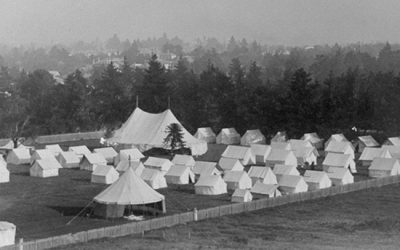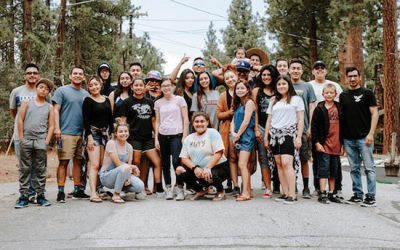The Seventh-day Adventist Church has been organizing and operating youth ministry programs since 1879.
In our opinion, youth ministry is one of the most important ministries a church can have.
Being a tween or a teenager isn’t easy. And being a Christian teenager can come with its own challenges, because during those years, kids are still figuring out their identities, their convictions, their priorities, their values…all while dealing with social pressures, school pressures, and any number of family dynamics.
So we want to ensure that young people have a space where they feel heard and accepted, while also being challenged and encouraged to grow. We want to show them the joy, peace, and purpose that come with following Jesus. And one of the goals of youth ministry is to help the youth find ways to get involved in church and discover their own personal gifts.
Adventists work toward these objectives together as a worldwide church, and together in our smaller communities. Our programming varies from group Bible studies, campouts, retreats, workshops, service activities, and more.
But let’s get a closer look at what goes into youth ministry efforts in the Adventist Church:
- Overview, history, and goals of Adventist youth ministry
- Methods and approaches
- Why youth ministry matters to Adventists
To start with, here are the general things we seek to accomplish with our youth ministry efforts.
Overview, history, and goals of Adventist youth ministry
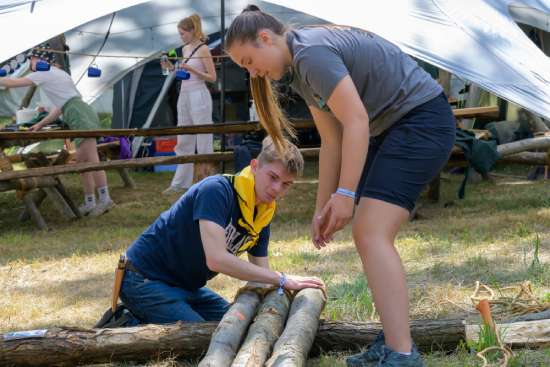 The ultimate, overarching goal of youth ministry is to help young people form a closer walk with Jesus.
The ultimate, overarching goal of youth ministry is to help young people form a closer walk with Jesus.
Stemming from that, we also want to encourage them to take an active role in their churches and their communities.
After all, young people have been making waves in ministry since Bible times!
Just look at the prophet Jeremiah:
“But the Lord said to me:
‘Do not say, “I am a youth,”
For you shall go to all to whom I send you,
And whatever I command you, you shall speak.
Do not be afraid of their faces,
For I am with you to deliver you,’ says the Lord” (Jeremiah 1:7-8, NKJV).
No matter their age, young people have an important role in spreading the gospel and demonstrating the example of Jesus’ love, compassion, and friendship.
And by introducing them to Jesus and fostering their spiritual growth, we can develop an intrinsic motivation to serve Him and others. We want to empower youth to discover their talents, and to use their ideas and leadership skills to do ministry wherever they go, and whatever they do.
It’s amazing what youth can accomplish for God. In fact, youth ministry efforts in the Adventist Church were even started by youth! In 1879, two teenagers named Luther Warren and Henry Fenner created a ministry to serve young people.1 They connected with others through Bible study and prayer.2 As their efforts grew and became more organized, they called it the Adventist Youth Society and also expanded to reach young adults after their teen years, as well.3
Today, youth ministries and young adult ministries operate separately as age-related needs became more diversified. But many young adult programs and initiatives that are sponsored by the General Conference of Seventh-day Adventists, or the world church headquarters, are operated under the umbrella of the “Adventist Youth” program.4
Adventist Youth programming, promotion, and resource distribution are overseen by the General Conference Youth Ministries Department. Beyond that, youth ministry directors from each subsequent administrative tier will make the best use of the General Conference’s resources for their respective areas.
When it comes to the actual boots-on-the-ground ministry efforts, they tend to be organized at the local level.
Individual churches, or sometimes the conference offices that oversee many churches in a given area, will decide what programs would be most helpful and effective for the youth in their communities.
This means that available programs vary from church to church. And the bigger the church, the more programs they’re likely to have.
They’ll usually make use of the manuals, curriculums, or programming available from the General Conference or their respective division, but some ambitious churches or conferences might create their own materials and programs that utilize local talent and leadership.
In many areas around the world, Adventist youth ministries are categorized into two groups. 10-15-year-olds are known as juniors and 16-21-year-olds are referred to as senior youth. As a church, we want to make sure we’re providing the most relevant materials and activities possible.
A 12-year-old typically faces different challenges and has different concerns than a 17-year-old. So in larger areas that have a diverse makeup of ages among the youth, you’re more likely to find that activities and groupings are organized into these categories. However, in smaller communities, youth programming might include all the teens, with a little bit of overlap into the pre-teens and early young adulthood.
However a local youth program is structured, these ministries are all united in mission. We want youth to know that they’re valued, respected, and very much needed! So we aim to provide community as well as opportunity.
With a safe and encouraging community, teens can feel a sense of belonging with other believers. And with approachable opportunities to get involved in service or evangelism, we can also provide mentorship along with experience in both ministry and leadership.
It is our prayer, our hope, and our goal that these ministry efforts will encourage them to know and love God, serve others, and continue their spiritual walks as active Christians for the rest of their lives.
Methods and approaches to youth ministry
As previously mentioned, youth programming can vary from church to church, conference to conference, country to country, etc. It all depends on size, availability of resources, and the needs of each community.
But there are still common threads within each youth ministry program. Here are the most common ways churches serve and engage young people.
Sabbath school (Bible study and fellowship)
Sabbath school classes meet every Sabbath. Typically these classes happen before the main church worship service, but the timing can vary at some locations.
Similar to adult Sabbath school classes, the youth group meets to study and discuss the principles and concepts found in the Bible. They might use weekly lessons from a curriculum provided by the General Conference, or they might choose other materials.
But whatever framework they use, the idea is to study and discuss spiritual topics relevant to their age group. And while doing so, they can enjoy dialogue with their peers and build friendships.
Everything you’d need to participate in a Sabbath school class is provided by the church. So when you walk into a youth Sabbath school for the first time, don’t worry about coming empty-handed. There should be materials there for you to use to follow along and participate.
Sabbath school teachers for youth can be pastors employed by the church or local conference, or they might be volunteers from the congregation. Volunteer leaders are typically selected by the local church’s nominating committee. This ensures that they’re properly vetted and trained. This process often includes background checks, leadership training, child safety and abuse prevention training, and an overview of the recommended programming materials.
All this effort is to ensure that anyone tasked with youth leadership is prepared and qualified.
Small group gatherings
 Small groups are typically a more informal get-together.
Small groups are typically a more informal get-together.
They can be organized by church leaders, youth pastors, youth leaders, or even just enthusiastic church members.
The idea is to provide a safe place and time, in addition to church, for youth to gather, bond, and learn more about God, the Bible, and applying spiritual truths to everyday life. The activities also vary but most feature Bible study, devotionals, prayer, discussion, games, or going on fun group outings.
You can find these groups by looking at the church website or asking church members about them.
The best thing about small groups is that it helps youth get to know other young Christians. The size of the group helps interactions be more personal and meaningful.
Church roles for young people
Congregations as a whole also encourage the youth to get involved with service roles in the church.
One official youth position is to become a junior deacon or deaconess. Volunteers must be voted in by the nominating committee (local church members) and must be at least 12 years old. Their general responsibility is to assist adult deacons in running the church. There are a lot of behind-the-scenes jobs that help a church service run smoothly, and it can be an excellent and enjoyable learning experience.
Common responsibilities include helping with setup, organizing the communion service, taking up the offering, or ushering. Sometimes they’ll help with the sound system or with greeting visitors before church.
Youth can also help with a church’s song service, read scripture, or offer prayer during church. But depending on the size of the church, there could be all kinds of opportunities to get involved.
Speaking/Testimonies/Evangelism
There are special programs for youth to travel to other places (often on mission trips) to tell others about the gospel at evangelistic meetings like the Share Him Ministries.
Youth also have the opportunity to give a testimony to other youth at youth rallies and at church week of prayer events.
Youth rallies are typically organized by the regional officers of the Adventist Church, to make sure events can cover a larger area and involve more people. These rallies are often multi-day events that let the youth have fun together in a positive and constructive environment, while also offering several activities that help them learn more about important biblical principles.
Weeks of prayer are usually a week-long evangelistic event where Adventist academy students and church members join together throughout the week, most likely in the evenings, to hear a guest speaker and pray together. These events can provide a spiritual boost or reawaken enthusiasm that can sometimes be smothered by the day-to-day grind.
Pathfinders and Master Guides
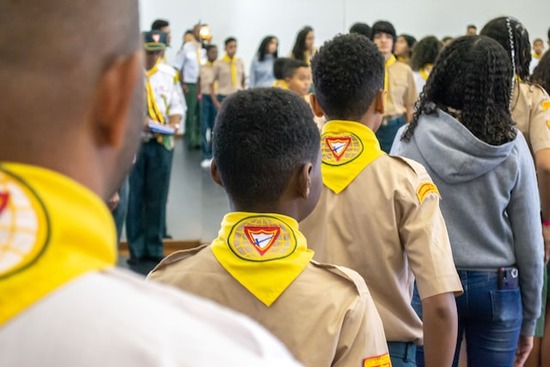
Photo by Jonas Kakaroto on Unsplash
If you’ve ever heard of boy scouts or girl scouts, this program will seem very familiar. This program starts in the pre-teen ages and then teenagers can become leaders.
In general, the Adventist Pathfinder club is for ages 10-15. Kids can earn badges by completing activities in various areas of learning, such as Bible, nature, home economics, crafts, survival skills, recreation, and vocational development.
Pathfinders also learn about how Jesus is a part of all of these things. It’s a way to take the classroom knowledge of God and the Bible out into the real world.
Pathfinders are also known for its fun events like field trips, camping trips, inter-club gatherings, and the long-anticipated Pathfinder camporee.
There is also a Master Guide course for older members (aged 16 and older). This program trains Master Guides to be Pathfinder leaders.
Ambassadors
The Ambassadors youth organization is designed for 16-21 year-olds.
While Ambassadors don’t receive badges, they meet together in small groups where they talk about relevant issues young people face.
These issues can include deciding one’s career, how to live a Christ-like life, and how to witness to others. The group also gathers together for outreach opportunities.
Summer camps
Adventist summer camps are one of the few youth activities that require you to sign up and pay. And that’s only because it’s truly a full-fledged summer camp experience.
Adventist summer camps feature all your favorite activities from your typical summer camp—hiking, crafts, water sports, and team-building games—but with all the benefits of a Christian environment.
As campers learn to tie knots and tie-dye shirts, they’ll also get to learn about Jesus, love, the Bible, compassion, mercy, friendship, servant leadership, and more.
Older youth have the option of working at these camps as counselors, or in other camp departments. There are lots of youth on the payroll at Adventist camps that have been long-time campers beforehand!
Youth conventions
One of the largest Adventist youth conventions is GYC (Generation of Youth for Christ).
They hold a convention once every year to encourage revival among young people. They also encourage them to get involved in youth evangelism. They have powerful worship and music services that get many positive reviews each year.
In fact, many young people actually decide to get baptized at this convention.
Other common Adventist youth events are Adventist Youth for Christ in Canada, and several youth conferences or youth congress events held in different parts of the United States.
To find more information about Adventist youth events, a local Adventist church’s website often posts news about regional events, or it will have a link to the conference or union website that will list such announcements.
Ministry and witnessing opportunities
There are tons of ministry opportunities available for young people.
Some of these include summer canvassing programs or mission trips.
Canvassing programs, also referred to as Literature Evangelism or colporteuring, involve selling or distributing Christian literature from door to door. Each year, countless youth attest to the enriching spiritual impact this ministry has had on their lives. And it’s common for the youth to stay in touch with the people they’ve met during a canvassing program.
Mission trips involve going to another location, often another country, to “be God’s hands and feet” by serving the needs of the people in the area. Usually there is a primary project for a mission trip, such as helping build a school or church building, or setting up a clean water system, or teaching skills to the local kids.
Why youth ministry matters to Adventists
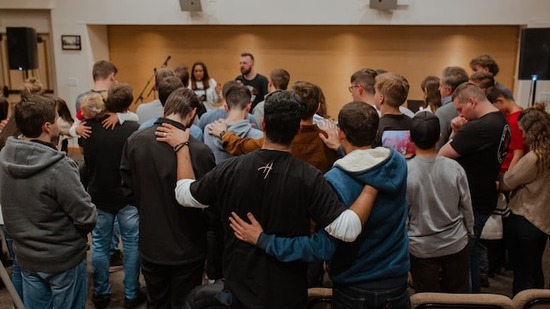
Photo by adrianna geo on Unsplash
The bottom line is: youth ministry matters because young people matter.
The Bible cautions everyone not to discount youth (Jeremiah 1: 7-8; 2 Timothy 4:12), and to make sure children are always welcome to join in and participate in learning and worship (Matthew 19:13-14).
And to best support youth in doing so, we have to be sure we’re meeting their needs and addressing their concerns.
So we create youth ministry programs to provide young people with a meaningful role in our church. And those youth will grow to strengthen the church and share the gospel throughout their lives.
But let’s face it, being young is hard.
School and social concerns are everything to a young person, and that’s a big part of why so many feel like their later school years are just one big identity crisis. It’s a complex process to figure out who you are, as well as what you believe and why.
We want to help young people know that they have a special, vital place in the Seventh-day Adventist Church. They can benefit from a support system that leads them through life’s dilemmas with biblical answers and Christian companionship, and provide opportunities to:
- Make life-long friends
- Meet older Christian mentors
- Grow in their knowledge of the Bible
- Grow in their relationship with Jesus
- Answer their deepest questions about their identity and purpose
- Learn how to use their talents to serve God
- Learn how to live a Christ-like life
Buz Menhardt, Associate Pastor of the New Market Seventh-day Adventist Church, has seen how youth ministry has changed the lives of the young people he’s known.
“Over time, the youth grow up, they mature, and oftentimes they’ll continue in the same kinds of ministry they were involved in as a young person. And they’ll be able to reach their peers and those younger than them.”
Adventist youth ministries are changing the lives of young people everywhere, empowering them to understand God’s plan for them.
You can start your search for youth activities by looking up the nearest Adventist Church, where you’ll find local information and announcements about larger events. You can also follow announcements on gcyouthministries.org.
Or if you’re interested in activities for younger children…
Find a Church
If you’re interested in finding a local Adventist church near you, you can use the Adventist Locator provided by the General Conference of Seventh-day Adventists.
- Seventh-Day Adventist Pastor’s and Elder’s Handbook for Youth Ministry: https://www.gcyouthministries.org/wp-content/uploads/Pastors-and-Elders-manual-on-youth-ministry.pdf[↵]
- Ibid. [↵]
- Ibid. [↵]
- Ibid. [↵]
Related Articles
More Answers
Seventh-day Adventist World Population and Demographics
The Adventist Church has more than 22 million members and 100,000 churches worldwide, plus a large system of hospitals, schools, and publishing houses. Learn more about this diverse church.
What Is a Seventh-day Adventist Camp Meeting?
Although camp meetings didn’t begin with the Seventh-day Adventist Church, they’re as much an Adventist thing as haystacks.
Camp meeting is an extended event for Adventists (and non-Adventists) of all ages to gather and participate in spiritual seminars and activities. During the event, attendees often camp in tents, campers, or RVs.
How to Join the Seventh-day Adventist Church
Whether you heard about the Seventh-day Adventist Church through a traveling evangelist, during your online searches, or through a loved one or relative, you might be considering joining yourself.
How Do Adventists Do Baby Dedications?
For Christians, dedication ceremonies for babies, also for older children, are an important time for parents and the church. It’s a special part of the worship service when parents present their young children to God and the church family. Both parents, along with the congregation, regard this as a solemn promise to be a Christ-like example to the child.
Do Adventists Celebrate Communion and Foot Washing?
Like many Christian denominations, Adventists regularly participate in communion, also referred to as the “Lord’s Supper” or the “Last Supper.” They also practice foot washing (John 13:1-20), or the “ordinance of humility,” during the service—which isn’t as common.
What is the Concept of “Present Truth” and Why is it Important?
Present truth is the principle that certain biblical truths are relevant to God’s people at specific times in history. God sends the Holy Spirit to reveal truths that help us better understand how to interpret and apply His Word in a present moment.
Do Seventh-day Adventists Celebrate Easter
Yes, many Seventh-day Adventists do celebrate Easter.
Do Adventists Celebrate Birthdays?
Yes, most Seventh-day Adventists do celebrate birthdays because we see them as excellent reminders of the life God has blessed us with. And we celebrate them the same way everyone else does—with friends, family, presents, and a special meal.
What Do Adventists Offer for Young Adults?
In recent years, the age group often classified as “young adults” has been trickier to engage. It’s been a significant concern for Christian churches around the world. Though interestingly enough, similar observations regarding young adults have been coming up in conversations about the economy, the entertainment industry, politics, and more.
Do I Need to be an Adventist to be Saved?
The answer to this question is simply, “no.”
When it comes to salvation in Jesus Christ, all that is required of a person is to acknowledge Jesus’ sacrifice for us, believe that He has saved us, and claim the free gift of salvation that is always available to us. Salvation is not based on denomination.
Do You Have to Be Vegetarian to Be Adventist?
Of course not. Membership in the Seventh-day Adventist Church has never included any dietary requirements. However, there might be some reasons people might think that. So many Adventists are vegetarians or even vegan, and a plant-based lifestyle has many health benefits.
All About Seventh-day Adventist Colporteurs
The Seventh-day Adventist Church uses a variety of methods to spread the hope of the gospel to the world. One of these ways is through colporteuring, also called “canvassing” or “literature evangelism.”
What Is an Adventist Book Center (ABC)?
When you walk into any one of the many Adventist Book Center (ABC) locations, chances are you’ll be greeted by pleasant gospel music in the background, friendly employees, and row after row of Christian books, movies, Bibles, study guides, kids’ games, and more.
Do Seventh-day Adventists Celebrate Holidays?
Wondering whether your Adventist classmate or coworker keeps the same holidays you do? Perhaps you want to include them in some festivities, but you also want to respect their beliefs. Thus, you’re unsure of how to navigate the holiday question. Will they accept your invitation to the office Christmas party?
The Adventist Haystack (It’s Not What You Think) + 4 Recipes
Haystacks are basically a taco salad—with an Adventist spin on it! Most versions are vegetarian and offer an endless combination of tasty toppings. We eat them often because they’re healthy, scrumptious, and easy to make.
Do Seventh-day Adventists Believe in Medical Care?
The Seventh-day Adventist Church believes in and supports evidence-based medical care. In fact, medicine has played a significant part in our history, and today we run a major health system with hospitals, medical schools, and clinics throughout the world.
All about Adventist Elementary Schools
The Seventh-day Adventist Church operates the largest Protestant education system in the world. A big part of this system is our K-8 elementary schools, or primary schools, as they’re known in other parts of the world.
What Are Pathfinder and Adventurer Clubs?
Like the boy or girl scouts, Pathfinders and Adventurers learn about nature and life skills. But what makes these clubs special is their purpose to bring young people closer to Jesus.
A Look at Adventist Colleges and Universities
On the outside, Seventh-day Adventist universities may not look much different than other college campuses. But the real differences are beneath the surface.
What Is ASI (Adventist-Laymen’s Services and Industries)?
ASI, which stands for Adventist-laymen’s Services and Industries, is a membership-based organization that provides support for Seventh-day Adventist laypeople (Adventist professionals who aren’t pastors).
What Are Adventist Evangelistic Meetings?
The Seventh-day Adventist Church puts a huge emphasis on sharing the gospel through evangelism, or sharing the gospel through preaching, teaching, and testimony. One of the ways we accomplish this is by organizing public events called evangelistic meetings.
Christian Summer Camps—A Cherished Adventist Ministry
School’s out, the sun’s shining, and your kids are thrilled to have the summer ahead of them. Then three days in, you hear, “I’m bored…”
Do Adventists Have Their Own Bible?
Adventists have some unique beliefs—you might be able to name some of them right now. The seventh-day Sabbath. Death as a sleep. Hell as nonexistence.
What Is Vespers?
Friday rolls around, and you’re spending time with your Adventist friends or relatives when they mention they’re going to vespers tonight.
Adventist Pastors
What is the role of a pastor in the Adventist Church? The position itself, at least as far as a local congregation is concerned, is not much different from that of pastors in other protestant denominations.
The Leadership Structure of the Seventh-day Adventist Church
The Seventh-day Adventist Church has a representative form of structure that connects its 90,000-plus congregations across the globe and gives its members a part in decision-making. Though the Church was incorporated in 1863, this system came about during the church’s reorganization from 1901 to 1903. It includes four levels of organization.
What to Expect When You Go to an Adventist Church
If you’re attending an Adventist church for the first time, you may wonder what it’s really like. While each Adventist church is unique in its collective personality and local culture, Adventist church services are generally similar to most other Protestant church services.
Adventist Education
Seventh-day Adventists have historically upheld the importance of a well-rounded, high-quality education. Instead of a one-size-fits-all approach to teaching and learning, the Adventist Education system operates on the principle of educating the “whole” person.
Evangelism
Evangelism is simply sharing the truths of the Bible with someone else. And Adventists are all into it.
Didn’t find your answer? Ask us!
We understand your concern of having questions but not knowing who to ask—we’ve felt it ourselves. When you’re ready to learn more about Adventists, send us a question! We know a thing or two about Adventists.





